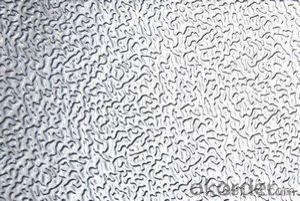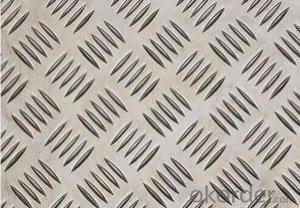checker aluminium sheet
- Loading Port:
- China Main Port
- Payment Terms:
- TT OR LC
- Min Order Qty:
- -
- Supply Capability:
- -
OKorder Service Pledge
Quality Product, Order Online Tracking, Timely Delivery
OKorder Financial Service
Credit Rating, Credit Services, Credit Purchasing
You Might Also Like
supply Mill-finished / coated aluminum plate/sheet/ coil:
Alloy: AA1050,1060,1100,1200,2024,3003,3304,3005,3015,5052,5086,5754,5083,6061,7050,7475,8011, etc
Temper: O, H14/16/18/22/24/32/ H112/H321/T6,T851,T7451,T7351, etc
Thickness: 0.02mm—20mm
Width: 100mm—2000mm (Can be slitted)
Notice: PE coating / PVDF coating / Embossment can be done if required.
- Q:my text says aluminium does not corrode much as a passive aluminium oxide layer is formed on it.Well other metals such as sodium adn potassium also form oxides. Why dont their oxides prevent further oxidation ?
- sodium oxide and potassium oxide are water soluble aluminium oxide is not water soluble. the layer formed of oxide on the aluminium surface is coherent and adherent with no pores and stuck to the metal surface. the layer is also passive to most acids and alkalies except HCl and anti passive ions if present. sodium oxide and potassium oxide dissolve in any aqueous medium forming the corresponding alkalies NaOH and KOH leaving the fresh metal surface exposed to more corrosion. also the reaction of Na and K with aqueous media like water and acids is quite vigorous and fast unlike aluminium which is mu less reactive
- Q:How to calculate the length of aluminum sheet with the thickness known?
- Thickness*width*length=weight/density, length=weight/(density*thickness*width). Ps: Keep unit the same.
- Q:Can aluminum coils be used in the production of aluminum composite ceilings?
- Aluminum composite ceilings can indeed incorporate aluminum coils. The utilization of aluminum coils as the foundational material for manufacturing aluminum composite panels is quite common. These panels, in turn, serve as the foundation for constructing ceilings. The coils themselves typically consist of high-quality aluminum alloy and have undergone numerous processes to guarantee their durability, strength, and visual appeal. For added protection, the aluminum coils are coated with a layer of either PVDF or polyester. This coating serves to enhance their resistance to weathering, UV rays, and corrosion. Additionally, this protective layer allows for a wide array of color options, thus providing ample flexibility in design choices for aluminum composite ceilings. In summary, aluminum coils play a vital role in the production of aluminum composite ceilings. They offer a lightweight, fire-resistant, and long-lasting solution for a variety of architectural and interior design applications.
- Q:Are aluminum coils suitable for pharmaceutical vial caps?
- Yes, aluminum coils are suitable for pharmaceutical vial caps. Aluminum is a commonly used material in the pharmaceutical industry due to its excellent barrier properties, corrosion resistance, and ability to be easily sterilized. It provides a tight seal, ensuring the integrity and safety of the vial contents. Additionally, aluminum coils can be easily formed into the desired shape and size for vial caps, making them a reliable choice for pharmaceutical packaging.
- Q:How do aluminum coils compare to other types of metal coils?
- Aluminum coils are lighter in weight compared to other types of metal coils, making them easier to handle and install. They also have excellent corrosion resistance, ensuring durability and longevity. Additionally, aluminum coils have good thermal conductivity, allowing for efficient heat transfer. However, they may have lower tensile strength compared to certain other metal coils. Overall, aluminum coils offer several advantages and are commonly used in various industries including HVAC and automotive.
- Q:I know when you stick weld aluminum you're more brazing than actually welding but i was just wondering about this, i want some electrodes just in case i need a temporary repair. Also what Amperage should i run it at,and what polarity?? my friend told me to run hotter than usual but hes only 14, and I dont know how reliable he is. Im 14 by the way also and have been welding for two years now and im always out running around the ranch doing small repairs. thanks ahead of time!
- Aluminum will oxidize quickly when it is heated in the air. You must have an inert gas around the weld when you are working it. A wire feed or T I G system is better than a stick machine. I suggest you do a lot of reading about aluminum and how to it is welded before you buy any tools. For small repairs that do not require much strength J B Weld will work.
- Q:How are aluminum coils used in the production of industrial machinery?
- Aluminum coils are widely used in the production of industrial machinery due to their unique properties and benefits. These coils are typically made from high-quality aluminum alloy, which offers excellent strength, durability, and corrosion resistance. One common application of aluminum coils in industrial machinery is in the manufacturing of heat exchangers. Heat exchangers play a crucial role in various industrial processes, including refrigeration, HVAC systems, and power generation. Aluminum coils are ideal for heat exchangers due to their high thermal conductivity, allowing for efficient heat transfer. Furthermore, aluminum coils are also utilized in the production of industrial equipment such as air compressors, pumps, and turbines. The lightweight nature of aluminum makes it an excellent choice for these applications, as it helps reduce the overall weight of the machinery. This, in turn, leads to improved energy efficiency and lower operational costs. Another significant advantage of aluminum coils is their malleability and formability. Aluminum is highly ductile, meaning it can be easily shaped and formed into various complex geometries required for the machinery's components. This allows manufacturers to create intricate parts and structures, ensuring precise fit and optimum performance. Additionally, aluminum coils offer exceptional resistance to corrosion, making them suitable for machinery used in harsh environments or exposed to corrosive materials. This corrosion resistance helps extend the lifespan of the machinery and reduces the need for frequent maintenance or replacement of parts. In summary, aluminum coils are essential components in the production of industrial machinery. They provide strength, durability, lightweight, and corrosion resistance, making them ideal for various applications such as heat exchangers, air compressors, pumps, and turbines. Their malleability also allows for intricate part fabrication, ensuring precise fit and optimal performance.
- Q:What are the color options available for aluminum coils?
- The color options available for aluminum coils are vast and varied. Aluminum coils can be coated with a wide range of colors through a process called coil coating. This process involves applying a layer of paint or coating to the aluminum surface to enhance its appearance and provide additional protection against corrosion and weathering. Some common color options for aluminum coils include white, black, gray, silver, bronze, and metallic finishes. Additionally, custom colors can also be created to match specific design preferences or brand requirements. These custom colors can be achieved through a color matching process where the desired color is formulated and then applied to the aluminum coils. It is worth noting that the availability of color options may vary depending on the manufacturer and supplier. However, with the advancement in coil coating technology, the range of color choices for aluminum coils has significantly expanded, allowing for greater flexibility in design and aesthetics.
- Q:What is the role of aluminum coils in the construction of power plants?
- The construction of power plants heavily relies on aluminum coils, particularly in their cooling systems. These coils play a vital role in facilitating heat transfer and maintaining efficient cooling within the power plant. When fuel or other energy sources are converted into electricity, power plants generate a significant amount of heat. To prevent overheating and ensure optimal performance, cooling systems are installed to dissipate this excess heat. Key to these cooling systems are the aluminum coils. Typically, the construction of air-cooled condensers and evaporators in the cooling systems involves the use of aluminum coils. These coils enable the transfer of heat from the power plant's equipment to the surrounding air. Their design ensures efficient heat transfer and dissipation by leveraging the high thermal conductivity of aluminum. The incorporation of aluminum coils in power plant construction offers several advantages. Firstly, aluminum is a lightweight material, making it easier to handle and install in large-scale power plants. This contributes to a reduction in construction time and costs. Additionally, aluminum exhibits high resistance to corrosion, guaranteeing the longevity and durability of the coils, even in harsh operating conditions. In addition, aluminum coils possess excellent heat transfer capabilities due to their high thermal conductivity. This characteristic enables them to efficiently transfer heat from the power plant equipment to the cooling medium, typically air. As a result, power plants can maintain stable operating temperatures and prevent equipment failures or performance issues caused by excessive heat buildup. Overall, aluminum coils are indispensable components in power plant construction, especially in the cooling systems. They facilitate efficient heat transfer, promote optimal cooling, and enhance the overall performance and reliability of power plants.
- Q:Can aluminum coils be used in corrosive gas environments?
- Corrosive gas environments can indeed accommodate the use of aluminum coils. Aluminum is widely recognized for its exceptional resistance to corrosion, particularly under atmospheric conditions. An oxide layer naturally develops on the metal's surface, acting as a safeguard against further corrosion. Nevertheless, it is crucial to acknowledge that aluminum is prone to vulnerability in the presence of specific corrosive gases, such as chloride and sulfur compounds. In such instances, it may be imperative to adopt supplementary protective measures, such as surface treatment or coating, to guarantee the durability and efficacy of the aluminum coils within corrosive gas environments.
1. Manufacturer Overview |
|
|---|---|
| Location | |
| Year Established | |
| Annual Output Value | |
| Main Markets | |
| Company Certifications | |
2. Manufacturer Certificates |
|
|---|---|
| a) Certification Name | |
| Range | |
| Reference | |
| Validity Period | |
3. Manufacturer Capability |
|
|---|---|
| a)Trade Capacity | |
| Nearest Port | |
| Export Percentage | |
| No.of Employees in Trade Department | |
| Language Spoken: | |
| b)Factory Information | |
| Factory Size: | |
| No. of Production Lines | |
| Contract Manufacturing | |
| Product Price Range | |
Send your message to us
checker aluminium sheet
- Loading Port:
- China Main Port
- Payment Terms:
- TT OR LC
- Min Order Qty:
- -
- Supply Capability:
- -
OKorder Service Pledge
Quality Product, Order Online Tracking, Timely Delivery
OKorder Financial Service
Credit Rating, Credit Services, Credit Purchasing
Similar products
New products
Hot products
Hot Searches
Related keywords




























